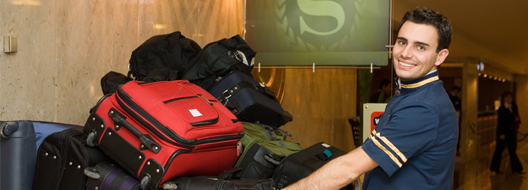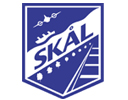Description


DESCRIPTION
PORTER BASIC LEVEL
The training course for Porter of Hotel organized by ANPA - National Academy Hotel Professions aims to train professionals particularly important within the hotel, as the point of reference for the proper performance of all ordinary activities and extraordinary hotel: from the aid guests in transport their luggage in the rooms, to the performance of tasks related to cleaning and tidying the common areas of an infant day and night (and day porter porter at night), to activities of ordinary and extraordinary maintenance of the water and electrical systems. The profession of Porter, practiced by men young and old, Italians and foreigners, also in possession of a single title of junior high school, allowing easy entry into the world of work the hotel, and reintegrate professionally well into old age. Learn well this job can be, therefore, a great and concrete job opportunities. The activities of the Porter are manifold: carrying luggage in the rooms, running errands on behalf of the guests, download and store the necessary products for the hotel (shampoo and soap, towels, etc.) and perform any other tasks set by its Senior Secretary (first or Executive Housekeeper Housekkeper). The Course of Porter Hotel organized by ANPA seeks to provide, therefore, the operational tools and techniques to learn the key points of a profession that, fundamentally, it requires good physical shape, good presence, courtesy and reliability, but also skills adequate to carry out tasks of cleaning, control, assistance, emergency and supervision, in view of the achievement of high standards of quality. The course will be structured on a total of 48 hours spread over a period of one month three times a week for three hours in class, during the hours 17:30 to 20:30.
Didactic Program
PORTER BASIC LEVEL
DIDACTICAL SCHEDULE:
• The shape and role of porter hotel: the professional profile, the relationship with the housekeeper and other hotel departments, the relationship with colleagues and clients
• Behavioural techniques and professional ethics: the importance of the uniform and personal care, education and experience, attitude and customer service responsibilities to customers and the company, operational tasks, public relations, management of special requests of customers
• Techniques of work organization: the knowledge of the organization and the individual hotel departments, communication between the reception and the housekeeping department, control of the conference, the management of lost items, the use of forms of department
• Techniques, methods and timing for the cleaning and maintenance of accommodation and conference rooms: the communication log, the Memorandum, the provision of employment that the job daily, the VIP list, checklist, maintenance requirements, the daily report of employment, the receipt for items lost, pick up cargo, handling, and inventory controls, the organization of the working day, the office of porter, the conference report, the reorganization of the conference rooms, the time necessary for the reorganization, cleaning fixtures and furniture, the evening service, the salt-free, living rooms and apartments, the evening cleaning equipment, cleaning products and equipment, the passe-partout, cleaning of common areas, maintenance and trade sectors fabrics, wallpaper, carpet, wood, marble, granite, tiles, ceramics, rubber and linoleum, handling loading and unloading stock minibar plans
• Room division and hotel architecture: annual and seasonal hotels, the hotels with vertical, horizontal and scattered distribution of outdoor spaces, common areas, the lobby and the area of the front office, the bar and restaurant, the halls, rooms, service areas, warehouses and kitchens, the laundry, the office, the technical spaces, gardens and sports facilities
• Communication Techniques hotel: the rules of behavior, growth and self-realization, the hierarchy of roles, behavioral criteria, the technical strengthening, team meetings and teamwork
• Concepts and techniques of accident prevention and safety at work: the standards of accident prevention and hygiene, the points of greatest risk (floors, doors, windows, stairs and landings, ceilings and controsoffittila preventive maintenance, hygiene at work, interventions first aid, fire safety, prevention measures, the available fire fighting, the use of the fire protection, smoke detectors, alarm buttons, fire hoses and fire extinguishers
• Prevention and Safety (teaching module optional - cost € 150,00 + VAT 22%)
Patronage & Partnership
With the patronage and the partnership of:
